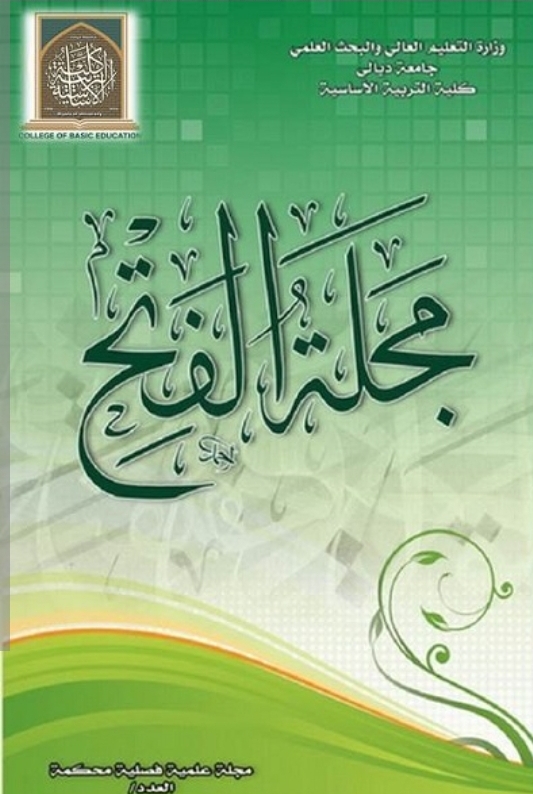Evaluating the e-learning higher diploma program at Princess Nourah Bint AbdulRahman University in light of ISTE standards
DOI:
https://doi.org/10.23813/FA/24/1/7Keywords:
Program Evaluating - Higher DiplomaAbstract
The study aimed to evaluate the e-learning higher diploma program at Princess Nourah Bint AbdulRahman University according to the students standards of the International Society for Technology in Education ISTE*S. The study adopted the case study approach through self-evaluating the higher diploma program and comparing its goals to ISTE*S standards and identifying its availability. After applying the study tools: the content analysis questionnaire, the analysis form and the open interview with the students, the results were clear that the goals of the diploma courses achieve all seven criteria, but in varying proportions in line with the field of objectives related to them, and the highest standards were Achieved is the first criterion (Empowered Learner), while the two weakest criteria were the second (Digital Citizen) and the sixth (Creative Communicator). Based on these results, the study recommended the necessity of reviewing the goals of the diploma courses and teaching strategies and adding some topics, in order to reach achieving higher standards.
References
أولاً: المراجع العربية:
أبوهاشم، السيد. (2016). "تقويم برنامج ماجستير علم النفس بكلية التربية جامعة الملك سعود من وجهة نظر الطلبة على ضوء معايير الاعتماد الأكاديمي". المجلة العربية لضمان جودة التعليم الجامعي. المجلد 9. العدد 24. ص ص 201-219.
البقاعي، سعيد. (2019). تقييم برنامج بكالوريوس التربية الخاصة في الجامعات الأردنية من وجهة نظر أعضاء الهيئات التدريسية والخريجين وأرباب العمل. رسالة دكتوراه غير منشورة. الجامعة الأردنية. الأردن.
الحياصات، خالد. بني عامر، أيمن. (2016). "تقويم برامج جامعة القصيم للدراسات العليا في ضوء معايير الهيئة الوطنية للتقويم والاعتماد الأكاديمي (NCAAA)". جامعة طيبة للعلوم التربوية. المجلد 11. العدد 3. ص ص 445-464.
آل سرور، نورة. (2019). "تنمية المواطنة الرقمية لاستخدام التكنولوجيات الحديثة في التعليم". مدونة تعليم جديد. متاح على https://www.new-educ.com/المواطنة-الرقمية-و-تكنولوجيا-التعليم.
آل سفران، محمد. (2015). "تقويم برامج الدراسات العليا بكلية التربية جامعة الملك خالد في ضوء معايير الجودة والاعتماد الأكاديمي من وجهة نظر أعضاء هيئة التدريس وطلبة الدراسات العليا". دراسات، العلوم التربوية. الجامعة الأردنية. المجلد 42. العدد 3. ص ص 847-871.
سلوى، عزوز. (2018). "تقويم البرامج في ضوء المعايير والنماذج - قراءة تشخيصية في الأدبيات النظرية". المجلة الدولية للدراسات التربوية والنفسية. المركز الديمقراطي العربي للدراسات الاستراتجية والسياسية والاقتصادية. مارس 2018. العدد 1. ص ص153-168.
سمر، العبادلة. (2015). تقويم برامج الدراسات العليا في الجامعات في محافظات غزة باستخدام نموذج القرارات المتعددة. رسالة ماجستير غير منشورة. غزة. جامعة الأزهز.
الشوابكة، يونس. (2018). "تقويم برنامج الماجستير في قسم علم المكتبات والمعلومات في الجامعة الأردنية في ضوء معايير جمعية المكتبات الأمريكية (ALA)". دراسات المعلومات والتكنولوجيا. المجلد 9. العدد 1. ص ص 1-33.
طعيمه، رشدي. (2004). تحليل المحتوى في العلوم الإنسانية. القاهرة. دار الفكر العربي.
عيسان، صالحة. الراسبي، زهرة. الهنائي، دلال. (2015). "تقييم برنامج ماجستير الإدارة التربوية بكلية التربية في جامعة السلطان قابوس من وجهة نظر الخريجين ورؤسائهم في العمل". الدراسات التربوية والنفسية. اﻟﻣﺟﻠد 9. العدد 1. ص ص 84-108.
القميزي، حمد. (2017). "نماذج وتجارب في تقويم البرامج والمقررات التربوية في الجامعات العالمية". التقويم في التعليم الجامعي، مرتكزات وتطلعات. كلية التربية. جامعة الجوف.
لقوقي، إلهام. (2016). آليات تقويم محتوى البرامج التعليمية مرحلة التعليم الثانوي أنموذجاً. رسالة ماجستير غير منشورة. كلية الآداب واللغات. جامعة قاصدي مرباح. الجزائر.
مراد، محمد. (2016). "تقويم جودة برنامجي البكالوريوس في قسمي علم المعلومات بجامعتي الملك سعود وطيبة باستخدام مقاييس التقويم الذاتي البرامجي للهيئة الوطنية للتقويم والاعتماد الأكاديمي". الاتجاهات الحديثة في المكتبات والمعلومات. المجلد 45. العدد 23. ص ص 11-56.
ثانياً: المراجع الأجنبية:
Ayad, Fuad. Ajrami, Sameh. (2017). "The Degree of Implementing ISTE Standards in Technical Education Colleges of Palestine". TOJET: The Turkish Online Journal of Educational Technology. April 2017. vo. 16. issue 2.
Khairutdinov, Ramil. Safin, Rais. Korchagin, Evgeniy. Mukhametzyanova, Flera. Fakhrutdinova, Anastasia. Nikishina, Svetlana.(2019). "The Content of Educational Programs in Technical Universities: Quality of Applying the Modern Professional Standards". International Journal of Instruction. vo.12. No.1. 357-370.
Mavropoulos, Azarias. Sipitanou, Aikaterini. Pampouri, Anastasia. (2019). "Training of Adult Trainers: Implementation and Evaluation of a Higher Education Program in Greece". International Review of Research in Open and Distributed Learning. February. vo.20.
Overbaugh, Richard. Lu, Ruiling. Diacopoulos, Mark. (2015). "Changes in Teachers’ Attitudes Toward Instructional Technology Attributed to Completing the ISTE NETS∗T Certificate of Proficiency Capstone Program". Routledge Taylor & Francis Group. vo. 32. Pp. 240–259.
Rourke, L. Anderson, T. Garrison, D. R. Archer, W. (2000). "Methodological Issues in the Content Analysis of Computer Conference Transcripts". International Journal of Artificial Intelligence in Education. vo. 11. Pp. 8-22.
Sergei Titov, Alexandr Kurilov. Natalya Titova, Irina Brikoshina. (2019). "IntegrativeAssessment Framework in Blended Learning". TEM Journal. vo. 8. Issue 3. Pp. 768-774.
Simsek, O. Yazar, T. (2016). "Education technology standards self-efficacy (ETSSE) scale: A validity and reliability study". Eurasian Journal of Educational Research. vo. 63. Pp. 311-334.
Tremonte, Annie. (2016). "Evaluating a Technology Course According to ISTE Student Standards". Corwin Press.
ثالثاً: مواقع الإنترنت:
Downloads
Published
How to Cite
Issue
Section
License
Copyright (c) 2020 https://creativecommons.org/licenses/by/4.0/

This work is licensed under a Creative Commons Attribution 4.0 International License.
حقوق النشر والترخيص
تطبق مجلة الفتح للبحوث التربوية والنفسية ترخيص CC BY (ترخيص Creative Commons Attribution 4.0 International). يسمح هذا الترخيص للمؤلفين بالاحتفاظ بملكية حقوق الطبع والنشر لأوراقهم. لكن هذا الترخيص يسمح لأي مستخدم بتنزيل المقالة وطباعتها واستخراجها وإعادة استخدامها وأرشفتها وتوزيعها ، طالما تم منح الائتمان المناسب للمؤلفين ومصدر العمل. يضمن الترخيص أن المقالة ستكون متاحة على نطاق واسع بقدر الإمكان وأن المقالة يمكن تضمينها في أي أرشيف علمي.
لمزيد من المعلومات، يرجى متابعة الرابط: https://creativecommons.org/licenses/by/4.0/.



